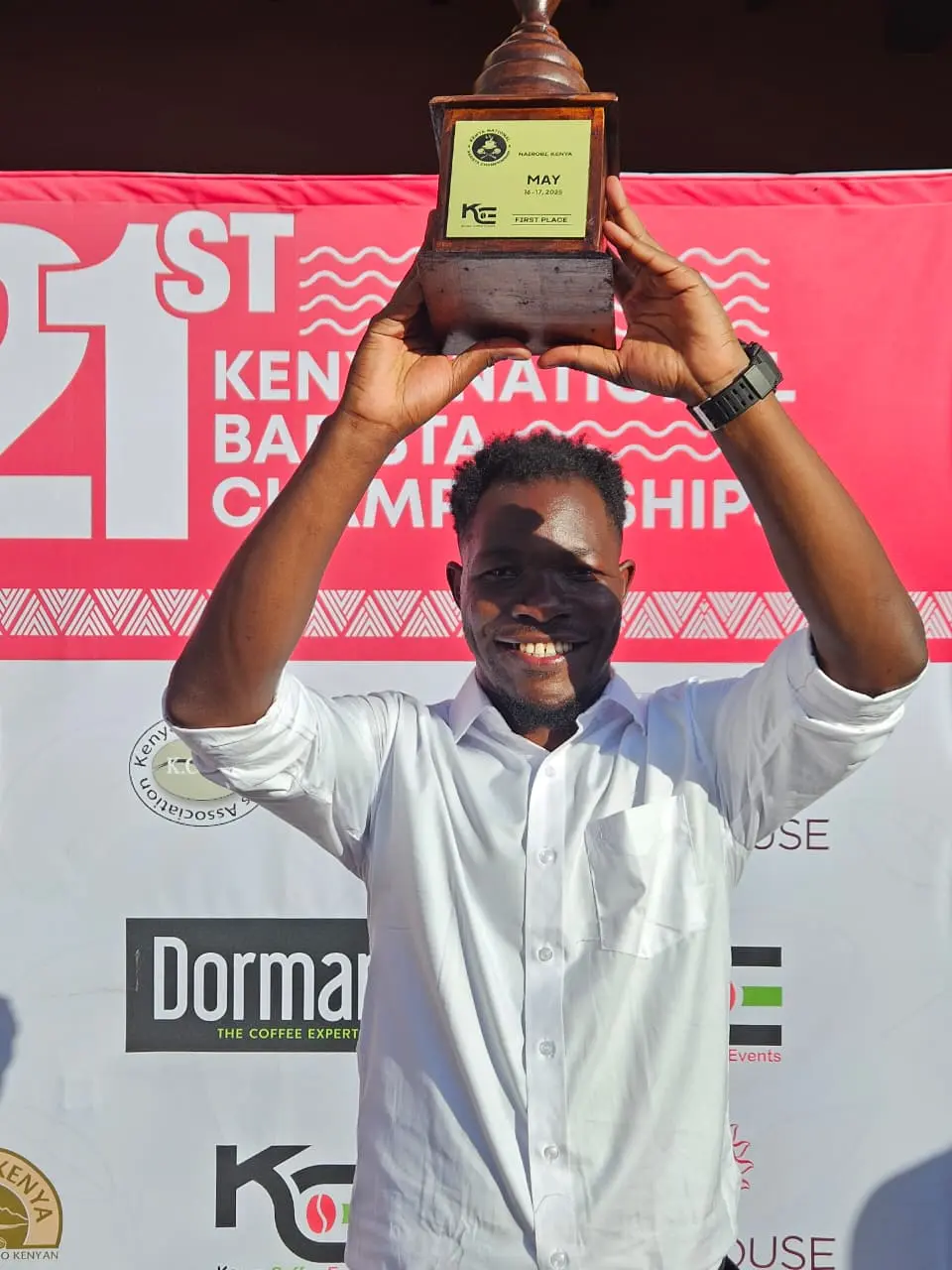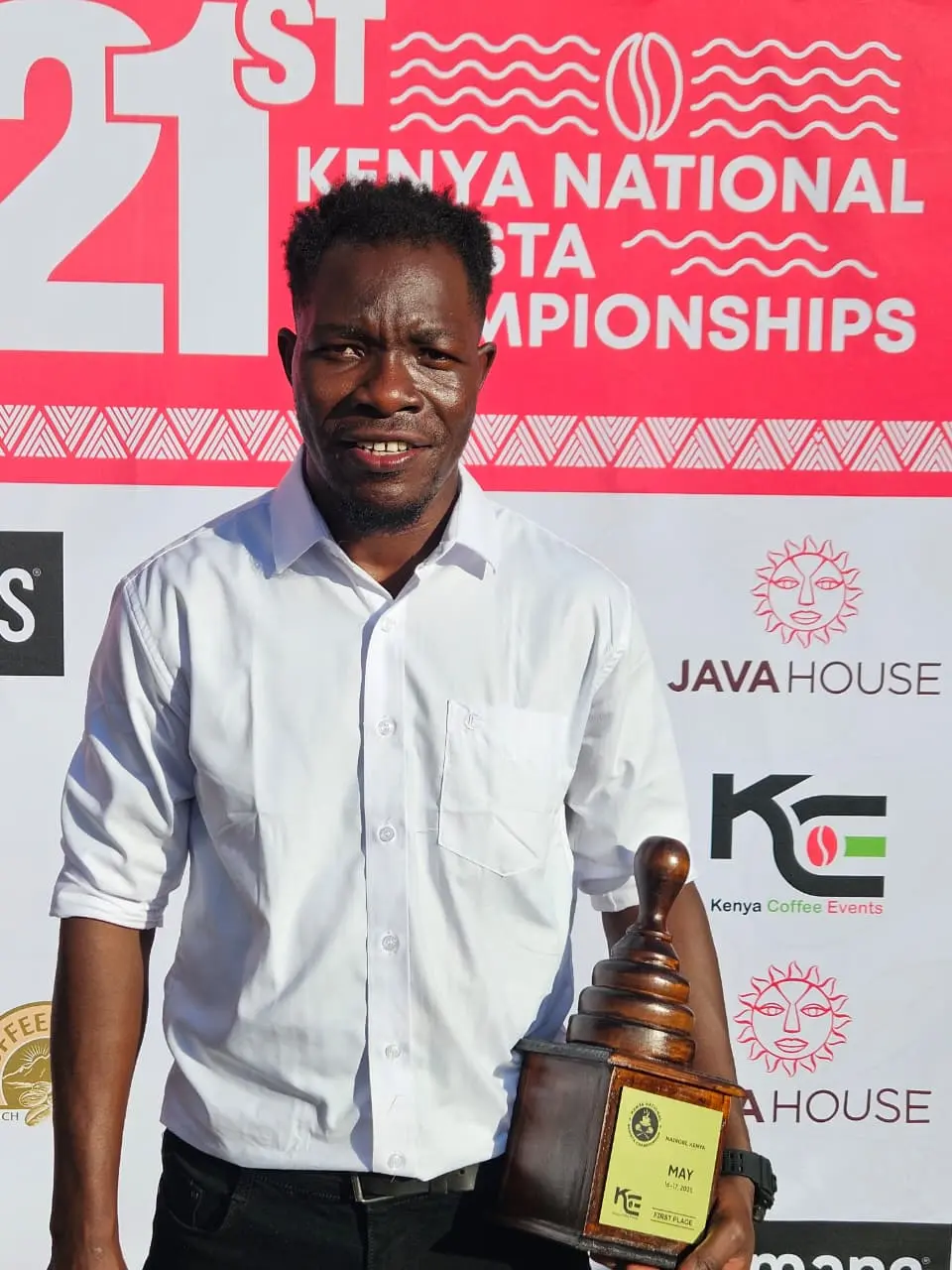
Tell us who you are and what you do in the coffee supply chain.
My name is Felix Ouma. I am a dedicated coffee roast master at Fairchain Kenya, where I lead the production of roasted coffee, manage our green coffee inventory, and oversee product development. My role is to ensure that the coffee roasted at its origin is represented to its full potential when it reaches the global market. I am also passionate about coffee preparation and sharing knowledge through training.
What's your 'over a drink' story?
I have made many great connections over a flat white, my favorite milk beverage. These moments have led to significant opportunities, including deals to supply both green and roasted coffee, consultation services, and training for business owners and their staff.
Beyond the job title, what made you fall in love with coffee?
Coffee has brought me many connections for which I am truly grateful. The one thing that made me fall in love with it is its incredible versatility. A producer on a farm is free to process their coffee in a unique way, which is amazing. At the roastery, we can roast the same coffee in numerous ways to highlight different flavor profiles. And for the barista, they can choose to brew coffee using a variety of methods, from filter to espresso-based drinks.
If you could share a cup of coffee with anyone in the world, living or historical, who would it be and why?
I would love to share a cup of coffee with my grandmother because I miss her so much.
What's the one thing you do outside of work that brings you the same kind of joy and focus as working with coffee?
I love art. Sketching and painting flowers, cartoons, and cars (locally known as "Mathree" or "Nganyas") brings me the same feeling as being at the roastery.
What's a coffee trend you're seeing that genuinely excites you, and one you'd be happy to see disappear?
I am excited that we can now measure and control the drum wall temperature of a roasting machine. Thanks to companies like Typhoon Coffee Roasting Machines for this feature, we can now create easy and repeatable batches without the struggle of creating a specific between-batch protocol. Another of origin.
The one trend I would like to see disappear is bad governance in the coffee sector, as farmers still don't get what they deserve.
From your perspective, what's a common misconception people have about your specific role in the coffee chain?
A common misconception, especially from employers, is that roasting coffee is simply a process of turning green beans brown or dark. They often assume there isn't much more to it. Others believe a roast master doesn't evaluate coffees, not realizing it's their job to roast the coffee to its full potential after a cupping session.
If you had to recommend just one coffee to someone who wants to understand the unique flavour of Kenyan coffee, what would it be and why?
I would recommend a proper brew from any filter method, such as a V60, Kalita, or even a Chemex. A black coffee highlights the distinct origin flavors, making it possible to distinguish coffee from Nyeri versus Kiambu, or from one region to another. This approach allows people to truly appreciate the unique characteristics of Kenyan coffee.
What’s the most challenging or surprising part of your job that people wouldn’t normally think about?
People often think the job is just fun—pressing buttons and operating machines. What they don't see is the more physically demanding aspects, like lifting heavy bags of green coffee when loading them into the pre-loader hopper.
For a home enthusiast, what is the single most important piece of advice you can give to instantly improve their daily brew?
Experiment with different brew ratios and continuously taste your coffee at various stages after roasting to see how the flavors develop over time.
Where do you see the Kenyan coffee industry in the next 5 years, and what role do you hope to play in its future?
I hope to play a role in making coffee, whether specialty or commercial, as readily available in every household as tea, which would increase domestic consumption. With the rise of specialty cafes, I believe that in the next five years, Kenya will become a hub for exceptional coffee and cafes.
What's the one piece of equipment you can't live without, either on the farm, in the roastery, or behind the bar?
My V60 Brewer.
If you had to describe your favorite coffee in three words, what would they be?
Crispy, refreshing and sweet.
What's a common brewing mistake you see people make at home, and what's the simplest way to fix it?
A common mistake is not following brewing fundamentals, such as not observing water temperature, coffee-to-water ratios, time, or grind size. For instance, my grandmother simply boils everything together. I wish I could help people like her by offering them measuring spoons, a small brew container with a lid, and a proper sieve to help them make a decent brew at home.
What's a flavour or aroma in coffee that you absolutely love and what's one you just can't stand?
I love fruity, floral, brown, and sweet aromas. I dislike flavors that negatively affect the taste, such as musty, baggy, or flat notes.
If someone is visiting your city/region for the first time, what's a coffee shop (besides your own) you would send them to and why?
I would send them to Hikuri Coffee, Spring Valley, Jowam Coffee, and Amka.
Tell us about winning the 2025 Kenyan National Barista Championships and the impact of competitions in the industry.
Winning the 2025 Kenyan National Barista Championships was a major milestone, but my journey in competitions began in 2019. From the very start, competing opened my mind to so many aspects of coffee. My knowledge grew tremendously in brewing techniques, roasting styles, and sensory skills, and with every attempt, I found myself constantly improving.
By 2025, my passion for sensory perception truly shaped my routine. I explored how we experience coffee, the role of the environment, and how even the vessels we use influence taste and flavor. To me, competitions are more than just contests; they bring baristas together, fostering creativity, encouraging knowledge-sharing, and building the confidence to express our craft.
Winning this year showed me the power of persistence and focus. It was a tough journey, but staying true to my goals made all the difference. Beyond the victory, I'm excited to share new techniques and inspire other baristas to step into the competition world and push their own boundaries.
